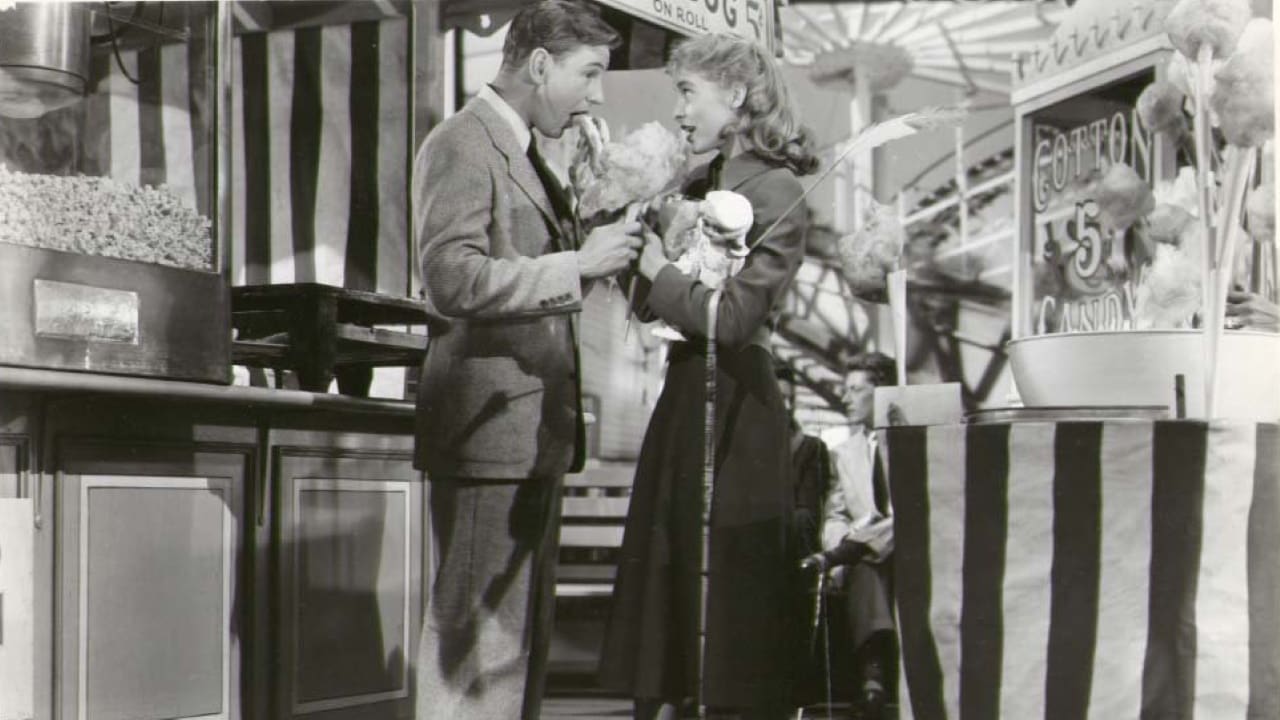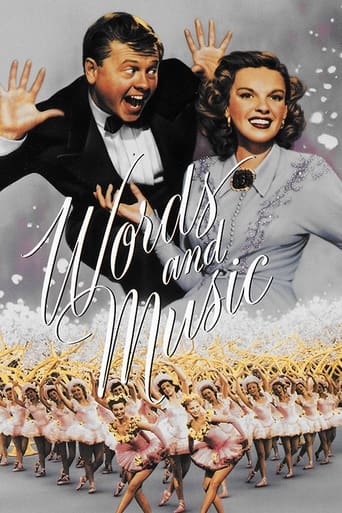

Larry Hart (Mickey Rooney) is an energetic songwriter. Herb Fields brings in Richard Rodgers to play his song and becomes his writing partner. The movie is told through Rodgers' eyes. Hart is taken with singer Peggy Lorgan McNeil. Fields gains some success and brings in his friends for a new Broadway show. Rodgers proposes to older leading actress Joyce Harmon but she turns him down.This is a fictionalized account of the music writing duo. The real story is nowhere to be found and shouldn't be expected especially during that era. It does feel scattered following both guys. Tom Drake doesn't have quite the charisma. Rooney and Garland have a final pairing. It's old fashion including the musical performances. At least, it has the songs. It's old fashion in many different ways.
... View MoreIf you want to see a good bio-pic about Rogers and Hart, it apparently doesn't exist. Instead, MGM did what studios often did during that era...they whitewashed the folks' lives and used a semi- fictionalized bio-pic as an excuse to present a myriad of song and dance numbers. These numbers feature a little of everyone from MGM...Gene Kelly, Judy Garland, Ann Sothern, Cyd Charisse, Perry Como and many others. The overall result is a rather bland and episodic film. So, if you'd like to know about the real Lorenz Hart (he was gay after all...but oddly really likes girls in this film), you might want to skip this film and read about him instead. The same could be said about "Night and Day", Warner Brothers bio-pic of Cole Porter that stripped away the gay and presents a very, very sanitized version of his life.So am I saying that "Words and Music" is a bad film? Yes and no. As a bio-pic, it stinks even though the actors try their best because it's a lie. But you might enjoy the production numbers...they are often very colorful and lovely.
... View MoreAnyone approaching this film as anything other than a gorgeous wallow through some of the most gossamer light verse welded seamlessly to soaring melodies will be bitterly disappointed. People who admire literate lyrics can't help but place Larry Hart in a three-way tie with Cole Porter and Frank Loesser with Johnny Mercer, Yip Harburg, Noel Coward snapping at their heels and Words and Music lays on a fair sampling of work of a tortured genius although inevitable as many again would still have failed to sate. In terms of actual biographical data however, forget it, there's hardly one authentic fact from beginning to end. This, of course, paves the way for interesting discussion; on the one hand is the school that says, 'look, you've got the songs, what more do you want', on the other 'maybe two per cent of FACT isn't too much to ask for'. I would argue that both schools have been well served elsewhere; I personally own several biographies and/or other works on both Hart alone and Rodgers and Hart and beginning arguably with Ella Fitzgerald's Rodgers and Hart Songbook there are countless albums devoted to the duo. So, what of the film? Presumably Michey Rooney was a shoo-in to play Hart on the basis that like Hart he was both short and musical. Tom Drake is also a good choice to portray Rodgers who, in real life was as colorless as Drake paints him here. This leaves more or less the music and even with great numbers - Isn't It Romantic, Bewitched, My Romance, Little Girl Blue etc conspicuous by their absence it's still a great collection.
... View MoreLike most biographies of musicians or lyricists WORDS AND MUSIC is great as a showcase of the music, but a bent synopsis of the life story. It's of a piece with films as diverse as A SONG TO REMEMBER about Chopin, YANKEE DOODLE DANDY about Cohan, NIGHT AND DAY about Cole Porter, or STARS AND STRIPES FOREVER about Sousa. Except for elements about Chopin's patriotism to his native Poland and his affair with George Sand (which was twisted unfairly against Sand) A SONG TO REMEMBER was the most successful film of this bunch in chronicling a composer's career and showing some type of tension ridden story line. YANKEE DOODLE DANDY was (due to the upbeat nature of Cohan's stage career) the best of these films, but hid everything negative about the man. The Cole Porter film NIGHT AND DAY did capture the problems of Porter's physical catastrophe (the riding accident that crippled him), but it left him a total heterosexual. It was not until the more recent movie with Kevin Kline that his homosexuality was brought out.It was a distinct negative for YANKEE DOODLE DANDY that Cohan was still alive, and vetoed any information about his first wife Ethel Leavy, and his campaign against Actor's Equity. Cole Porter was similarly alive when NIGHT AND DAY came out, but the studio would never (in the late 1940s) discuss homosexuality. Otherwise, we know Porter loved the film - he said he could not complain about a movie where he was portrayed by Cary Grant!With WORDS AND MUSIC, concentrating as it did on Lorenz Hart (safely dead in 1948) it made nonsense about that lyricists personal demons. As mentioned on another review, Hart was fully as gay as Porter or Tschaikovsky were. For most of his life he was unhappy about this and sought a woman he could love who would make him a heterosexual. As has been pointed out, Vivienne Segall was the Broadway star he approached on several occasions to marry, and he never could get her to say yes (probably a wise move by Vivienne). Unfortunately, her last rejection was during the revival of A CONNECTICUT YANKEE in 1943, and it played a role in undermining his spirits.The film shows June Alysson doing the "Thou Swell" number from YANKEE's original production in 1930. For the revival, Hart wrote the lyrics for his last masterly piece - Morgan Le Fay's "To Keep My Love Alive", which Ms Segall sang on opening night. Ironically, Hart died before the opening night of the revival. Broadway people in the know were aware that Vivienne may have turned down Larry, but that she came as close to loving him as was possible for a woman. When she finished her number, there was a standing ovation for her - and for the man who was not quite the man of her dreams.This film is full of good moments, from Alysson in the above number, and Perry Como doing "Mountain Greenery" and Rooney and Garland in their last duet on film. It does not touch upon the struggles of Hart and Rodgers in getting Hollywood to take their work seriously. Fortunately their skillful use of "song - dialog" appears in several of the Paramount films of the early 1930s, most notably in the great LOVE ME TONIGHT and HALLELUJAH, I'M A BUM. There use of ballet (with George Ballanchine) in ON YOUR TOES on Broadway is not noted, nor is their pushing one of the best first book musicals: PAL JOEY. One can go on like this about what is not properly shown. It was not until a few years later that a solid dual biography about collaborators in musical theater, THE GREAT GILBERT AND SULLIVAN, turned up with Robert Morley and Maurice Evans. But in that case, both central characters were safely dead, and their personal quarrels were so well known to make a real story line, punctuated by segments from their operettas. Even so, this was not enough to change Hollywood technique - the next big musical biography was THE STARS AND STRIPES FOREVER with Clifton Webb, a good film but barely with any details of the subject's life and non-musical achievements.As was mentioned on this thread in another review, Larry Hart's final, fatal binge (reminiscent of the father's death in A TREE GROWS IN BROOKLYN, by the way) was done after his attending the first night's performance of OKLAHOMA. Hart probably saw the handwriting on the wall: a new lyricist named Oscar was on the horizon to take his place - a good family man or impeccable theatrical background and success, and not a drinker! But there is another element to it. The split between Hart and Rodgers had been growing for awhile, and Rodgers (per forma) had offered the job of lyricist in OKLAHOMA to Hart. Hart did not like the book, and begged out. He actually was approached by another composer to do the lyrics for an operetta. It was Emmerich Kalman, best known for the operetta COUNTESS MARITZA. Hart was still thinking about this offer (he had done lyrics for the movie version of THE MERRY WIDOW for MGM in 1934). Whether he and Kalman might have been as successful as Rodgers and Hammerstein were is a curious question to ponder.
... View More